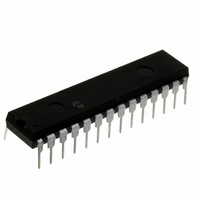PIC16F916-I/SP Microchip Technology, PIC16F916-I/SP Datasheet - Page 55

PIC16F916-I/SP
Manufacturer Part Number
PIC16F916-I/SP
Description
IC PIC MCU FLASH 8KX14 28SDIP
Manufacturer
Microchip Technology
Series
PIC® 16Fr
Datasheets
1.PIC16F616T-ISL.pdf
(8 pages)
2.PIC16F913-ISS.pdf
(330 pages)
3.PIC16F913-ISS.pdf
(8 pages)
4.PIC16F913-ISS.pdf
(34 pages)
5.PIC16F913-ISO.pdf
(274 pages)
Specifications of PIC16F916-I/SP
Program Memory Type
FLASH
Program Memory Size
14KB (8K x 14)
Package / Case
28-DIP (0.300", 7.62mm)
Core Processor
PIC
Core Size
8-Bit
Speed
20MHz
Connectivity
I²C, SPI, UART/USART
Peripherals
Brown-out Detect/Reset, LCD, POR, PWM, WDT
Number Of I /o
24
Eeprom Size
256 x 8
Ram Size
352 x 8
Voltage - Supply (vcc/vdd)
2 V ~ 5.5 V
Data Converters
A/D 5x10b
Oscillator Type
Internal
Operating Temperature
-40°C ~ 85°C
Processor Series
PIC16F
Core
PIC
Data Bus Width
8 bit
Data Ram Size
352 B
Interface Type
SSP/I2C/AUSART/SPI
Maximum Clock Frequency
20 MHz
Number Of Programmable I/os
24
Number Of Timers
3
Operating Supply Voltage
2 V to 5.5 V
Maximum Operating Temperature
+ 85 C
Mounting Style
Through Hole
3rd Party Development Tools
52715-96, 52716-328, 52717-734
Development Tools By Supplier
PG164130, DV164035, DV244005, DV164005, PG164120, ICE2000, DV164120
Minimum Operating Temperature
- 40 C
On-chip Adc
5-ch x 10-bit
Lead Free Status / RoHS Status
Lead free / RoHS Compliant
Lead Free Status / RoHS Status
Lead free / RoHS Compliant, Lead free / RoHS Compliant
Available stocks
Company
Part Number
Manufacturer
Quantity
Price
Company:
Part Number:
PIC16F916-I/SP
Manufacturer:
Microchip Technology
Quantity:
1 800
Company:
Part Number:
PIC16F916-I/SP
Manufacturer:
JST
Quantity:
4 300
- PIC16F616T-ISL PDF datasheet
- PIC16F913-ISS PDF datasheet #2
- PIC16F913-ISS PDF datasheet #3
- PIC16F913-ISS PDF datasheet #4
- PIC16F913-ISO PDF datasheet #5
- Current page: 55 of 274
- Download datasheet (5Mb)
4.2
PORTB is a general purpose I/O port with similar
functionality as the PIC16F77. All PORTB pins can have
a weak pull-up feature, and PORTB<7:4> implements an
interrupt-on-input change function.
PORTB is also used for the Serial Flash programming
interface.
EXAMPLE 4-2:
2004 Microchip Technology Inc.
BCF
BCF
CLRF
BSF
BCF
MOVLW
MOVWF
BCF
BCF
Note:
PORTB and TRISB Registers
STATUS,RP0 ;Bank 0
STATUS,RP1 ;
PORTB
STATUS,RP0 ;Bank 1
STATUS,RP1 ;
FFh
TRISB
STATUS,RP0 ;Bank 0
STATUS,RP1 ;
Analog lines that carry LCD signals
(i.e., SEGx, COMy, where x and y are seg-
ment and common identifiers) are shown
as direct connections to the device pins.
The signals are outputs from the LCD
module and may be tri-stated, depending
on the configuration of the LCD module.
INITIALIZING PORTB
;Init PORTB
;Set RB<7:0> as inputs
;
Preliminary
4.3
RB<7:6> are used as data and clock signals, respectively,
for both serial programming and the in-circuit debugger
features on the device. Also, RB0 can be configured as an
external interrupt input.
4.3.1
Each of the PORTB pins has an individually configurable
internal weak pull-up. Control bits WPUB<7:0> enable or
disable each pull-up. Refer to Register 4-6. Each weak
pull-up is automatically turned off when the port pin is
configured as an output. The pull-ups are disabled on a
Power-on Reset by the RBPU bit (OPTION_REG<7>).
4.3.2
Four of the PORTB pins are individually configurable
as an interrupt-on-change pin. Control bits IOCB<7:4>
enable or disable the interrupt function for each pin.
Refer to Register 4-5. The interrupt-on-change feature
is disabled on a Power-on Reset.
For enabled interrupt-on-change pins, the values are
compared with the old value latched on the last read of
PORTB. The ‘mismatch’ outputs of the last read are
OR’d together to set the PORTB Change Interrupt flag
bit (RBIF) in the INTCON register (Register 2-3).
This interrupt can wake the device from Sleep. The user,
in the Interrupt Service Routine, clears the interrupt by:
a)
b)
A mismatch condition will continue to set flag bit RBIF.
Reading or writing PORTB will end the mismatch con-
dition and allow flag bit RBIF to be cleared. The latch
holding the last read value is not affected by a MCLR
nor Brown-out Reset. After these Resets, the RBIF flag
will continue to be set if a mismatch is present.
Note:
Any read or write of PORTB. This will end the
mismatch condition.
Clear the flag bit RBIF.
Additional PORTB Pin Functions
WEAK PULL-UPS
INTERRUPT-ON-CHANGE
If a change on the I/O pin should occur
when the read operation is being executed
(start of the Q2 cycle), then the RBIF
interrupt flag may not get set. Furthermore,
since a read or write on a port affects all bits
of that port, care must be taken when using
multiple pins in Interrupt-on-change mode.
Changes on one pin may not be seen while
servicing changes on another pin.
PIC16F91X
DS41250B-page 53
Related parts for PIC16F916-I/SP
Image
Part Number
Description
Manufacturer
Datasheet
Request
R

Part Number:
Description:
IC PIC MCU FLASH 8KX14 28SOIC
Manufacturer:
Microchip Technology
Datasheet:

Part Number:
Description:
IC PIC MCU FLASH 8KX14 28QFN
Manufacturer:
Microchip Technology
Datasheet:

Part Number:
Description:
IC PIC MCU FLASH 8KX14 28SSOP
Manufacturer:
Microchip Technology
Datasheet:

Part Number:
Description:
IC,MICROCONTROLLER,8-BIT,PIC CPU,CMOS,LLCC,28PIN,PLASTIC
Manufacturer:
Microchip Technology
Datasheet:

Part Number:
Description:
IC,MICROCONTROLLER,8-BIT,PIC CPU,CMOS,SOP,28PIN,PLASTIC
Manufacturer:
Microchip Technology
Datasheet:

Part Number:
Description:
IC,MICROCONTROLLER,8-BIT,PIC CPU,CMOS,DIP,28PIN,PLASTIC
Manufacturer:
Microchip Technology
Datasheet:

Part Number:
Description:
IC,MICROCONTROLLER,8-BIT,PIC CPU,CMOS,SSOP,28PIN,PLASTIC
Manufacturer:
Microchip Technology
Datasheet:

Part Number:
Description:
IC, 8BIT MCU, PIC16F, 32MHZ, SOIC-18
Manufacturer:
Microchip Technology
Datasheet:

Part Number:
Description:
IC, 8BIT MCU, PIC16F, 32MHZ, SSOP-20
Manufacturer:
Microchip Technology
Datasheet:

Part Number:
Description:
IC, 8BIT MCU, PIC16F, 32MHZ, DIP-18
Manufacturer:
Microchip Technology
Datasheet:

Part Number:
Description:
IC, 8BIT MCU, PIC16F, 32MHZ, QFN-28
Manufacturer:
Microchip Technology
Datasheet:

Part Number:
Description:
IC, 8BIT MCU, PIC16F, 32MHZ, QFN-28
Manufacturer:
Microchip Technology
Datasheet:

Part Number:
Description:
IC, 8BIT MCU, PIC16F, 32MHZ, QFN-28
Manufacturer:
Microchip Technology
Datasheet:

Part Number:
Description:
IC, 8BIT MCU, PIC16F, 32MHZ, SSOP-20
Manufacturer:
Microchip Technology
Datasheet:

Part Number:
Description:
IC, 8BIT MCU, PIC16F, 20MHZ, DIP-40
Manufacturer:
Microchip Technology
Datasheet:











